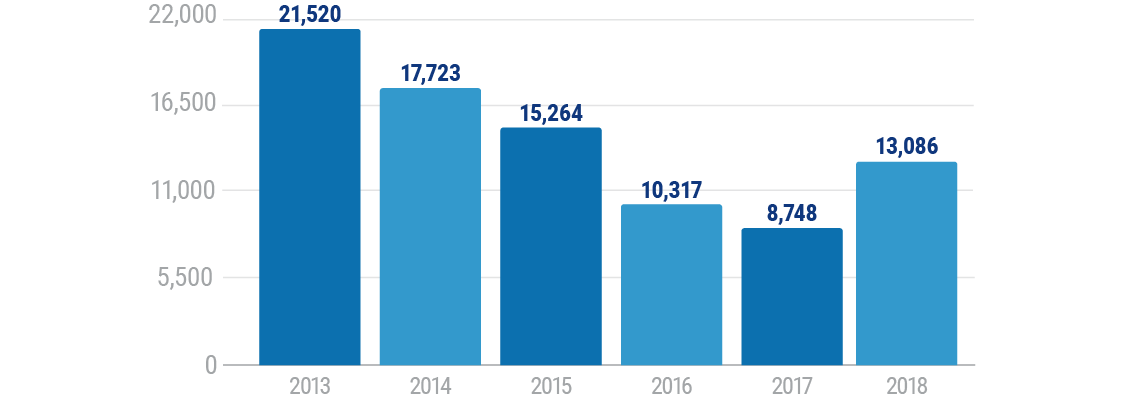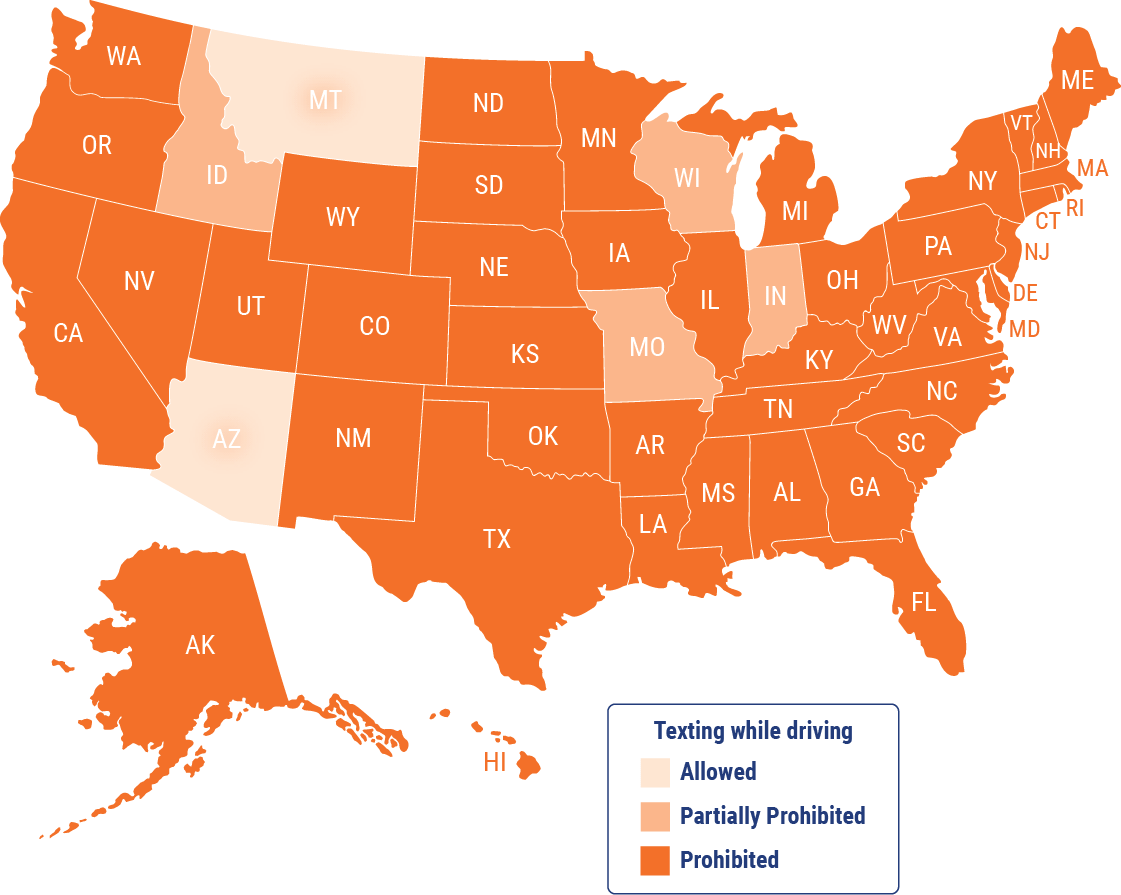Oregon Distracted Driving
(It's more than just not texting.)

There are roughly 55,000 car accidents every year in Oregon. And most of these are simple distracted driving mistakes that are completely preventable.
That’s why arguably THE most important thing you can do behind the wheel is keep your hands at 10 and 2 and your eyes on the road. Always.
What Is Distracted Driving?
The Oregon Department of Transportation (ODOT) defines distracted driving as what “occurs when a driver diverts attention to something not related to driving that uses the driver’s eyes, ears or hands.”
ODOT lists four types of driver distractions:
- Visual: looking at something other than the road
- Auditory: hearing something not related to driving
- Manual: handling something other than the steering wheel
- Cognitive: thinking about something other than driving
The most dangerous distractions are the ones that involve more than one type of distraction. An example of that would be using your cell phone, which, if you count the time spent looking at the phone to dial a number or see who is calling, involves all four.
Distracted Driving Statistics in Oregon
You don’t have to follow the local news every night to know that distracted driving is a problem, but here are a few statistics that might help you understand just how serious it is in Oregon:
- On average, distracted driving causes an accident every 2.5 hours in Oregon.
- From 2013 through 2017, distracted driving accidents in Oregon resulted in 18,429 injuries and 95 fatalities.
- Of these, 1,577 injuries and fatalities involved the distraction of a cell phone.
- Between 2013 and 2018, 86,658 people were convicted for violating Oregon’s distracted driving laws.
Leading Causes of Driver-Error Accidents in Oregon

As you can see, distracted driving law violations have steadily declined as drivers have adjusted to the change in behavior. The spike in 2018 was due to new, tougher laws that were enacted in October 2017.
Does Oregon Have Laws against Distracted Driving?
Yes.
Oregon’s statewide distracted driving law currently prohibits:
- Reading, writing, and sending text messages or emails from a handheld device
- Talking on a handheld cell phone
- Using any type of handheld mobile communications device
- Drivers under 18 from using any cell phone or other mobile communication device – even if it is in hands-free mode.
Are There Any Exceptions to the Distracted Driving Laws in Oregon?
Yes.
Oregon does make exceptions to its distracted driving laws, like:
- It's okay to send and receive texts using voice-to-text hands-free technology as long as you're 18 or older.
- Drivers are allowed to do a single touch or swipe for the purpose of activating or deactivating the device.
- Handheld cell phone use (and any type of cell phone use by minors) is permitted when using the phone to summon medical help when nobody else is available to do it.
- Handheld devices may be used when your vehicle is pulled off the road and stopped or parked. It is not permitted at stop lights or when stopped in traffic.
- Use of an electronic logging device is permitted for commercial drivers, as required by law.
- Two-way radios can be used by CB users, school bus drivers and utility truck drivesr when used within the scope of their employment.
- Use of mobile electronic devices is permitted for ambulance and emergency vehicle drivers, including police, firefighters, and EMS providers, when used within the scope of their employment.
- Use of a HAM radio is permitted for drivers 18 and older.
Oregon Distracted Driving Laws at a Glance
| Yes | No | |
| Is texting while driving legal? | X | |
| Can you send/receive texts at a red light? | X | |
| Is handheld device use permitted? | X | |
| Any special restriction for young drivers? | X | |
| Is headphone/headset use permitted? | X |
Is It Legal to Eat a Cheeseburger While Driving in Oregon?
Yes. But that doesn't mean you should.
Distracted driving comes in many forms, and eating a cheeseburger can be just as distracting as talking on a handheld cell phone. Basically, anything that takes your attention away from the primary task of driving presents a potential hazard.
So, what happens if a police officer in Oregon sees you eating a cheeseburger while driving down the highway? In most cases, nothing. There's no law that specifically states that you can't eat while driving in this state.
However, even legal distractions (such as eating or adjusting the radio) can significantly increase your risk of being in an accident or driving erratically, and these are actions that can earn you a citation. It's always better to avoid as many distractions as possible.
Unless you're really in a hurry, you’d probably be better off eating your Big Mac indoors or in the parking lot.
What's the Difference between Primary and Secondary Enforcement of Distracted Driving Laws?
Primary enforcement of distracted driving laws means the police can pull you over if they see you violating state distracted driving laws.
Secondary enforcement of distracted driving laws means the police can cite you for violating distracted driving laws only if you break another law while doing so.
Oregon uses primary enforcement.
This means that even if you're in total control of your vehicle while texting or talking on a handheld cell phone, a police officer who sees you can pull you over and write up a citation for violating the state’s distracted driving laws.
What's the Penalty for Distracted Driving in Oregon?
When it comes to distracted driving citations, Oregon isn't playing around. If you get a ticket, you'll be facing:
- First offense, with no crash: This is a Class B violation. You can be fined between $260 and $1,000. Points will also be assessed against your driving record.
- First offense, with a crash: This is a Class A violation. You can be fined between $435 and $2,000. Points will also be assessed against your driving record.
- Second offense: This is a Class A violation. You can be fined between $435 and $2,000. Points will also be assessed against your driving record.
- Third offense (within ten years): This is a Class B misdemeanor. You can be fined between $2,000 and $2,500 and face up to 6 months in jail. Points will also be assessed against your driving record.
If your first offense doesn't result in an accident, you can take a state-approved distracted driving avoidance class. Completing this course within four months can eliminate your fine, but it doesn't erase the violation or the points against your driving record.
Oregon compared to the rest of the US on texting and driving restrictions

Every state in the US has a law that prohibits some sort of cell phone usage except Montana and Arizona; however, in 2021, Arizona will roll out new cell phone restriction laws, leaving Montana the last in line.
Does Distracted Driving in Oregon Increase Insurance Rates?
Yes.
If you're cited for distracted driving in Oregon, you'll have points assessed against your driving record. This is true even if you complete a distracted driving avoidance course to eliminate a fine for a first offense.
Any time you have points assessed against your driving record, you can expect to see your car insurance rates go up. The amount your rate goes up will depend on which insurance company you use and your overall driving history. In Oregon, a distracted driving citation causes rates to go up a whopping $440 a year – the third-highest rate increase in the country.
And if you have a safe driver discount, you can say goodbye to the lower rates it gives you. Distracted driving will almost certainly disqualify you from receiving this discount, and this can cause your rate increase to be even more painful.
What If I Drive into Another State?
Distracted driving laws vary by state, so if you drive into a neighboring state that has different laws, you're required to follow their laws. Claiming ignorance of the law will not get you out of a citation.
Nevada allows drivers under 18 to talk on the phone using hands-free technology. Does this mean that your 17-year old can talk on the phone legally once they drive across the border? Yes, it does, but that doesn't mean they should.
Similarly, Idaho still permits drivers to use handheld cell phones. Does this mean you can switch from hands-free to handheld once you drive into that state? Yes, it does, but why would you?
What Is Oregon Doing To Prevent Distracted Driving?
On top of strengthening its laws against cell phone use while driving, the state of Oregon is dedicated to educating the public about the dangers posed by distracted driving.
To this end, they have rolled out a new media campaign that includes ads on Facebook, billboards, digital advertisements, radio PSAs, videos, Web banners, and graphic concepts.
So What Can You Do?
Quite simply, just put the phone away — even if that means in the glove compartment. The fines themselves are definitely not worth it, let alone the more serious consequences to you and others on the road. Let’s all just get where we’re going safely and save the texting until you get home.
https://www.oregon.gov/odot/safety/pages/distracted.aspx
https://www.oregon.gov/ODOT/Safety/Documents/Distracted_Driving_Fact_Sheet.pdf
https://www.oregon.gov/ODOT/Data/Documents/QuickFacts_2017.pdf
https://olis.leg.state.or.us/liz/2017R1/Downloads/MeasureDocument/HB2597/Enrolled
